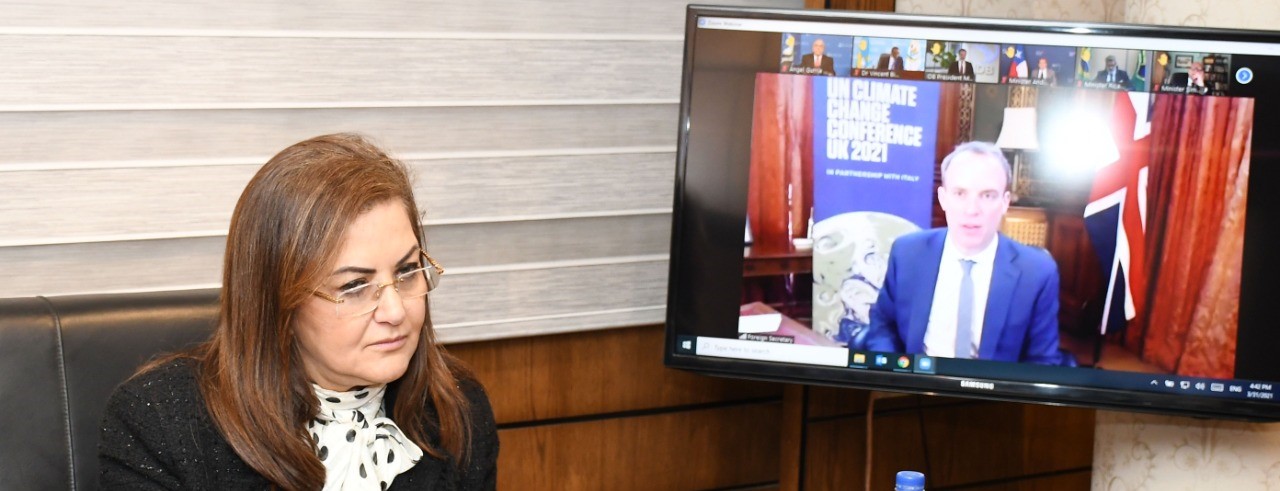Planning Ministry represents Egypt in the Ministerial Conference on Climate Development

01 April 2021
The United Kingdom (UK) hosted the Ministerial Conference for Climate Development yesterday, where it helped countries most vulnerable to the effects of climate change set the international agenda in the lead up to the COP26 climate conference that the UK will host in Glasgow in November this year.
The meeting, chaired by COP26 President Alok Sharma and UK Foreign Secretary, Dominic Raab, was held virtually and attended by the UK International Advocacy for Adaptation and Resilience for COP26 Climate Conference Ann Marie Trevelyan.
The ministerial meeting brought together representatives from different countries, including the Egyptian Minister of Planning and Economic Development Dr. Hala El-Said, the US Special Presidential Envoy for Climate John Kerry, and senior representatives from France, Germany, the UAE, and Sudan.
The meeting discussed four areas, including the work to find solutions to the impacts of climate change facing many developing countries.
The meeting also discussed how to respond better to address losses and damages, reduce financial pressure in developing countries, and improve climate change-prone countries' access to finance to remove carbon from their economies.The meeting also discussed ways to improve the quantity and quality of climate-related financing, including support for the most vulnerable groups.The ministerial meeting was also attended by representatives of youth groups, indigenous peoples, and international financial institutions such as the World Bank and the European Bank for Reconstruction and Development.Hala El-Said, the Egyptian Minister of Planning, said that the Egyptian government has taken many steps at the national level to face the challenges of climate change, represented by the implementation of several projects to protect the northern coasts from rising sea levels, in addition to implementing a project to rehabilitate and cultivate 1.5 million acres to achieve food security and compensate for land deterioration and erosion in the Nile Delta.The Egyptian government has also implemented a project to rehabilitate and renew the national network of water canals for EGP 68.5 billion (3.65 billion euros) in the framework of modernizing traditional irrigation methods and improving the efficiency of using water resources, in addition to infrastructure development projects and the rehabilitation of informal areas.The Egyptian government has worked to improve the quality of life in the countryside, targeting 1,500 villages in the first phase-out of a total of 5,000 villages within the (A Decent Life) initiative.El-Said explained that these projects aim to integrate the three pillars of sustainable development, implement the national strategy for sustainable development (Egypt Vision 2030), and achieve sustainable development goals.El-Said pointed out that most of these projects are funded from national resources, in addition to a mixture of resources and support from development partners, noting the importance of increasing this support, taking into account the burden imposed by the outbreak of the Corona pandemic.El-Said reviewed the policies and measures set by the Egyptian government related to climate finance, including the adoption of "Sustainability Standards", which are criteria that ensure that public investment projects included in the national investment plan take into account environmental sustainability standards, as 15% of the national investment plan projects for the fiscal year 2020 / 2021 are green projects. The Egyptian government aims to double this percentage in 2021/2022 and aims to achieve 50% to 60% of green projects by 2024/2025.El-Said added that Egypt launched its first "Green Bonds" with a value of 750 million US dollars, as a pioneer in this regard in the Middle East and Africa region. “Egypt is currently working on preparing and launching a "National Climate Change Strategy" and a "National Report for Financing Development (FFD) Report) to identify the pace to identify needs, gaps, opportunities, and challenges to address climate change achieve sustainable development, and eradicate poverty,” She added.Before the meeting, the UK government announced £ 500,000 funding for the new Voluntary Carbon Market Integrity initiative.High-quality voluntary carbon markets allow organizations or individuals to purchase carbon credits without being legally required to do so, for example for reasons related to social responsibility.









